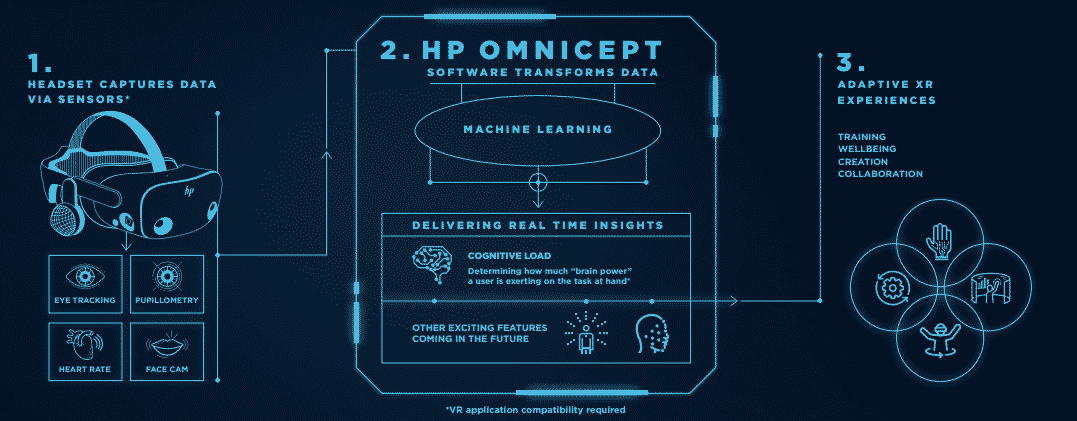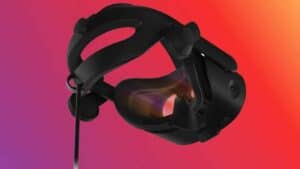In a fascinating development, the HP Reverb G2 VR headset will get eye-tracking and the capability to measure cognitive load. We don’t have all the details, but let’s unpack what we know so far – and the potential implications. We may be in a global pandemic, but XR developments continue at a mindboggling pace. A week ago, we were talking about Facebook Connect and the new standalone Oculus Quest 2, and now we have a VR headset that will measure cognitive load.
HP Reverb G2 Announcement
Here are the details of HP’s Reverb G2 Omnicept Edition from their press release:
- Reverb G2 DNA: Reverb G2 Omnicept Edition builds on the foundation of the Reverb G2, the highest resolution VR headset among major vendors, delivering cutting-edge optics, inside-out tracking, spatial 3D audio, and improved controllers with natural gestures.
- Eye Motion and Gaze: Understand how the user is responding to content based on their focus area and understanding engagement levels, based on where they instinctively look.
- Facial Expression: Enables naturally expressive avatars while collaborating around 3D designs for more natural and engaging conversations, helping enable faster and more efficient outcomes in a cross-functional development processes.
- Heart Rate: Understand how a user is responding to an experience or training, based on their heart rate. For example, practitioners can adapt wellness treatments in VR-based on their specific client’s reactions.
- Foveated Rendering: With integrated eye tracking, this HMD is able to discern the user’s gaze direction, enabling a reduction in GPU load and improved image quality within the user’s foveal region, enhancing VR realism.
The Omnicept software stack looks like this:

HP has created a remarkable headset that registers facial expressions, heart rate, and eye movements. The eye-tracking feature alone will allow for sophisticated foveated rendering where the display only renders in high-resolution the area of a scene you are focusing on (just like our eyes do in real life). By generating multiple data sources, the HMD has obvious use-cases in training, design, wellness, and research.
According to Jim Nottingham, general manager and global head, Advanced Compute and Solutions, HP Inc.,
The HP Omnicept Solution will open new possibilities for VR development and its impact on enterprise training, remote education, collaboration, research and development, and specialized wellbeing. This type of data-driven approach will be fundamental to creating user-centric experiences for better VR in the future.
Measuring Cognitive Load
The most intriguing part of the HP Reverb G2 announcement is the cognitive load feature. Their announcement video offers a quick overview.
According to HP,
Sensors on the headset, including eye tracking, heart rate, pupillometry, and face camera, enable the HP Reverb G2 Omnicept Edition to capture physiological responses. The integrated Omnicept SDK, powered by advanced machine learning algorithms, then interprets the data and allows developers to create a user-centric VR experience that provides actionable insights into how end users engage and respond during the experience.
This is a goldmine for developers as it opens up the physiological side of our immersive experiences. And for education and workforce training, it opens up a vast realm of data and analytics. Your users might say they understand an academic or training scenario, but the data from their headsets might tell you otherwise. The future of assessment may lay in your students’ or workers’ facial expressions and heart rates.
Initial Thoughts
HP’s announcement left us feeling like we’re at an all-you-can-eat buffet. It’s hard to know where to begin in digesting so many features on an HMD, but a couple of thoughts on the implications of the Reverb G2 Omnicept Edition:
- HP is staking a claim to high-end VR. Competing against Facebook in the standalone VR HMD market makes little sense. The social media behemoth wants the middle ground to itself as is clear in their cancelation of the Rift S.
- We need to see more details on HP will handle personal data. While HP says their Omnicept-powered applications will comply with general data protection regulation (GDPR) requirements and maintain confidentiality, the EU and other organizations may feel otherwise.
- How will users react to a VR headset that shares physiological data? We’re okay with our trackers and Apple Watches telling us (or even our doctors) about how we perform or respond to something. But some users may balk when that data goes to a corporation or educational institution.
A final thought – and this is where VR gets interesting. We can envision a day when virtual avatars may know more about us than our closest friends. We’re skilled at navigating social situations and concealing feelings from others. That’s going to be much more difficult as we stand in a virtual environment and interact with an AI-driven avatar that responds to our physiological data. Our future virtual avatar assistants could become our closest friends or our worst enemies.
There is no word yet on pricing for the HP Reverb G2 Omnicept Edition, and it will take a high-end PC (with an NVIDIA VR Ready Quadro or GeForce Turing based GPU) to run it. But it very well could be a ground-breaking development for virtual reality. We’ll update you as we learn more.
Emory Craig is a writer, speaker, and consultant specializing in virtual reality (VR) and generative AI. With a rich background in art, new media, and higher education, he is a sought-after speaker at international conferences. Emory shares unique insights on innovation and collaborates with universities, nonprofits, businesses, and international organizations to develop transformative initiatives in XR, GenAI, and digital ethics. Passionate about harnessing the potential of cutting-edge technologies, he explores the ethical ramifications of blending the real with the virtual, sparking meaningful conversations about the future of human experience in an increasingly interconnected world.

